- عنوان کتاب: Microwaves, Millimeter Wave and Terahertz Liquid Crystals
- نویسنده: Yijun Feng
- حوزه: موج میلیمتری
- سال انتشار: 2024
- تعداد صفحه: 283
- زبان اصلی: انگلیسی
- نوع فایل: pdf
- حجم فایل: 9.95 مگابایت
کریستال مایع، که گاهی اوقات به عنوان حالت چهارم ماده یا مزوفاز شناخته میشود، حالت منحصر به فردی از ماده است که خواصی بین مایعات معمولی و کریستالهای جامد دارد. این حالت با درهم شکستن الگوی سه حالته، دیدگاه ما نسبت به ماده را تغییر داده است. در یک محدوده دمایی خاص، مواد کریستال مایع هنگام ذوب شدن مستقیماً از کریستال یا جامد به مایعات ایزوتروپیک تبدیل نمیشوند، بلکه از یک سری مزوفازهای میانی ترمودینامیکی پایدار عبور میکنند.
برای مدت طولانی، کریستالهای مایع صرفاً یک کنجکاوی علمی بودند. چند کشف پیشگامانه در دهه 1960 منجر به LCD بسیار فراگیر امروزی شد. با کشف و بهرهبرداری بیشتر از خواص کریستال مایع، کریستال مایع به سرعت حرکت خود را فراتر از محدوده محدود نمایشگر شتاب میدهد.
کریستال مایع به دلیل ناهمسانگردی الکترومغناطیسی قابل تنظیم، ذاتاً برای کاربردهای الکترومغناطیسی امیدوارکننده است. تحقیقات گسترده و فشرده، کریستال مایع را به طور قابل توجهی به یکی از مرزهای تحقیقاتی داغ برای فناوریهای پیشرفته مایکروویو، موج میلیمتری و تراهرتز ارتقا داده است. با ورود ارتباطات 5G و ارتباطات 6G که در شرف وقوع است، پیشبینی میشود که کریستال مایع نقش حیاتی در برآورده کردن نیاز مبرم به دستگاههای مایکروویو و موج میلیمتری فشرده، همهکاره و سبک در دستگاههای قابل حمل و مراکز ارتباطی ایفا کند. در دو دهه گذشته شاهد کاربردهای روزافزونی بودهایم.
اگرچه مقالات متعددی منتشر شده است، اما تا آنجا که نویسندگان میدانند، این اولین مونوگراف بین رشتهای در مورد مایکروویوها، امواج میلیمتری و کریستالهای مایع نماتیک تراهرتز است.
این کتاب با مقدمهای و فیزیک مقدماتی کریستال مایع عمومی آغاز میشود و پس از آن مروری بر کاربردهای مایکروویوها، امواج میلیمتری و تراهرتز کریستالهای مایع نماتیک ارائه میشود. سپس آخرین پیشرفتهای تحقیقاتی داخلی از جمله سنتز کریستال مایع، اندازهگیری خواص دیالکتریک، ساخت دستگاههای کاربردی و چند دستگاه کاربردی پیشرفته نمونه ارائه میشود.
فصل 1 مقدمهای بر کریستالهای مایع عمومی ارائه میدهد. اول از همه، مفهوم اساسی کریستالهای مایع توضیح داده میشود. برخی از نمونههای شناخته شده از کریستالهای مایع برای آشنایی خوانندگان با برداشتهای دست اول ارائه شده است. در ادامه، تاریخچه کریستال مایع به ترتیب زمانی ارائه شده است. نقاط عطف تاریخی و پیشگامان برجسته شدهاند. پس از آن، یک طبقهبندی سیستماتیک از کریستالهای مایع انجام شده است. این فصل با خلاصهای از کاربردهای کریستالهای مایع بر اساس آخرین بررسیهای ادبی، که تنها کاربردهای تثبیتشده، تجاریشده یا حتی صنعتیشده را شامل میشود، به پایان میرسد.
عملکرد کریستال مایع به عوامل داخلی و خارجی متنوعی بستگی دارد. یک گام مهم در کاربردهای صنعتی کریستال مایع، درک نظری فازهای کریستال مایع برای کنترل، پیشبینی و حتی مهندسی خواص کریستال مایع است. در فصل 2، عناصر فیزیک پیچیده بینرشتهای کریستال مایع به طور خلاصه شرح داده شده است. توجه بر کریستال مایع نماتیک متمرکز شده است. مهمتر از آن، مطابق با کاربردهای برجسته کریستال مایع در فرکانسهای مایکروویو، موج میلیمتری و تراهرتز، خواص الکترومغناطیسی حیاتی برای چنین کاربردهای الکترومغناطیسی و همچنین تأثیر میدانهای الکترومغناطیسی بر کریستالهای مایع مورد توجه بیشتری قرار گرفته است.
فصل 3 با معرفی مختصری از طیف الکترومغناطیسی با توجه ویژه به باندهای موج مایکروویو، موج میلیمتری و تراهرتز آغاز میشود. در ادامه، مروری بر کاربردهای کریستال مایع در فرکانسهای مایکروویو، موج میلیمتری و موج تراهرتز ارائه شده است. این مرور کلی و بررسیهای موضوعی زیر بر اساس یک بررسی ادبیات و منابع جمعآوریشده است. در نهایت، بررسیهای مختصری در مورد موضوعات خاصتر ارائه شده است.
سنتز مخلوطهای کریستال مایع نماتیک جدید با ناهمسانگردی دیالکتریک بالا، تلفات دیالکتریک کم و نقطه ذوب پایین برای کاربرد در باند K در فصل 4 ارائه شده است. ابتدا تأثیر ساختار مولکولی بر خواص دیالکتریک بررسی شده و سپس مطالعهای بر وابستگی دمایی خاصیت دیالکتریک و ویسکوزیته کریستال مایع انجام میشود. سپس چهل و پنج ترکیب کریستال مایع واسطه در سری 5 با ناهمسانگردی دیالکتریک بالا و نقطه ذوب پایین سنتز میشوند. در نهایت، هفت مخلوط کریستال مایع نماتیک مایکروویو جدید با ناهمسانگردی دیالکتریک مختلف توسعه داده میشوند.
در فصل 5، یک روش جدید اختلال تشدیدکننده موجبر دو لبه برای توصیف مایکروویو کریستالهای مایع پیشنهاد شده است. این روش الزامات آزمایش دقیق ناهمسانگردی دیالکتریک، ویژگیهای تنظیم دیالکتریک، تلفات دیالکتریک و باند فرکانس کاری مورد نیاز کریستال مایع نماتیک مایکروویو را برآورده میکند. این روش اطلاعات ارزشمندی را برای درک کریستالهای مایع نماتیک مایکروویو و تحقیق و توسعه بیشتر ارائه میدهد.
Liquid crystal, sometimes referred to as the fourth state of matter or mesophase, is a unique state of matter that has properties between those of conventional liquids and those of solid crystals. It has changed our vision of matter by shattering the three-state paradigm. Within a specific temperature range, liquid crystal materials do not change from crystals or solids directly to isotropic fluids when they melt but go through a series of thermodynamically stable intermediate mesophases.
For a long time, liquid crystals were merely scientific curiosity. A few ground-breaking discoveries in the 1960s led to the overwhelmingly ubiquitous LCD today. With more and more liquid crystal properties explored and exploited, liquid crystal quickly accelerates its momentum beyond the narrow niche of display.
Liquid crystal is inherently promising for electromagnetic applications because of its tunable electromagnetic anisotropy. Extensive and intensive researches have significantly advanced liquid crystal into one of the hot research frontiers for cutting-edge microwave, millimeter wave and terahertz technologies. With the arrival of 5G communications and the forthcoming 6G communications, liquid crystal has been anticipated to play a crucial role to meet the imperative need for compact, versatile and lightweight microwave and millimeter wave devices in portable devices and communication hubs. We have been witnessing soaring applications in the past two decades.
Although numerous papers have been published, to the best knowledge of the authors, this is the first ever interdisciplinary monograph on microwaves, millimeter waves and terahertz nematic liquid crystals.
This book opens with an introduction and elementary physics of generic liquid crystal, followed by a retrospective review of microwaves, millimeter waves and terahertz applications of nematic liquid crystals. Latest in-house research progress including synthesis of liquid crystal, measurement of dielectric properties, fabrica-tion of functional devices and a few representative advanced functional devices is then presented.
Chapter 1 gives an introduction to generic liquid crystals. First of all, the basic concept of liquid crystals is explained. Some well-known examples of liquid crystals are given to familiarize readers with first hand impression. Next, the history of liquid crystal is chronologically presented. Historical milestones and pioneers are high-lighted. After that, a systematic classification of liquid crystals is conducted. This chapter ends with a briefing of applications of liquid crystals based on the latest liter-ature survey, featuring only well-established, commercialized or even industrialized applications.
The performance of liquid crystal is dependent on a variety of internal and external factors. A crucial step in the industrial applications of liquid crystal is the theoretical understanding of the liquid crystal phases for controlling, predicting and even engi-neering liquid crystal properties. In Chap. 2, elements of the intricate interdisciplinary liquid crystal physics are briefed. Attention is focused on nematic liquid crystal. More importantly, in consistency with the featured applications of liquid crystal in microwave, millimeter wave and terahertz frequencies, electromagnetic properties critical for such electromagnetic applications as well as effect of electromagnetic fields on liquid crystals are given more concerns.
Chapter 3 begins with a brief introduction of the electromagnetic spectrum with intensified interest in microwave, millimeter wave and terahertz wave bands. An overview about applications of liquid crystal at microwave, millimeter wave and terahertz wave frequencies is next presented. The overview and the following topical reviews are based on a literature survey and the collected literatures. Finally, brief reviews on more specific topics are given.
Synthesis of novel nematic liquid crystal mixtures with high dielectric anisotropy, low dielectric loss, and low melting point for K-band application is presented in Chap. 4. The effect of molecular structure on dielectric properties is studied first, followed by a study on the temperature dependence of dielectric property and viscosity of liquid crystal. Forty-five intermediate liquid crystal compounds in 5 series with high dielectric anisotropy, and low melting point are then synthesized. Ultimately, seven new microwave nematic liquid crystal mixtures with different dielectric anisotropy are developed.
In Chap. 5, a new perturbation method of double-ridge waveguide resonator is proposed for microwave characterization of liquid crystals. It meets the requirements of accurately testing the dielectric anisotropy, dielectric tuning characteristics, dielec-tric loss and required working frequency band of the microwave nematic liquid crystal. This method provides valuable information for understanding microwave nematic liquid crystals and further research and development of microwave nematic liquid crystal materials.
Liquid crystal cell is one of the essential elements in reconfigurable microwave, millimeter wave and terahertz functional devices. In Chap. 6, a process for fabricating nematic liquid crystal cells for microwave, millimeter wave and terahertz functional devices is presented. It is based on a xenomorphic substrate and solves the packaging and uniformity issues of large and thick nematic liquid crystal layer.
Microwave phase shifters are one of the core components in electronic information systems and phased array radar systems. In Chap. 7, a miniature K-band microwave nematic liquid crystal-based phase shifter that can realize 360° phase shift in K-band is proposed.
A frequency tunable and pattern reconfigurable 1 × 4 phased array antenna is designed in Chap. 8. Numerical simulation proves that the antenna can dynamically adjust its operating frequency between 14.5 GHz and 16.4 GHz and continuously and dynamically control the beam direction between –20° and 20°.
In Chap. 9, nematic liquid crystal (NLC) is introduced to develop novel meta-materials, namely multifunctional digital metamaterials of arbitrary base. A proof-of-concept prototype consisting of a superstrate of quartz, an array of metallic patches, a substrate of NLC and a ground is proposed. The novel coding mech-anism has been proven through both numerical simulation and preliminary experi-ments. The potential of the novel metamaterial is demonstrated by two representative applications.
این کتاب را میتوانید از لینک زیر بصورت رایگان دانلود کنید:
Download: Microwaves, Millimeter Wave and Terahertz Liquid Crystals







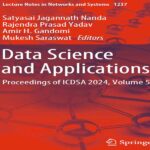



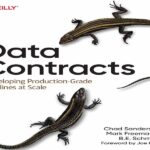
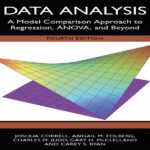
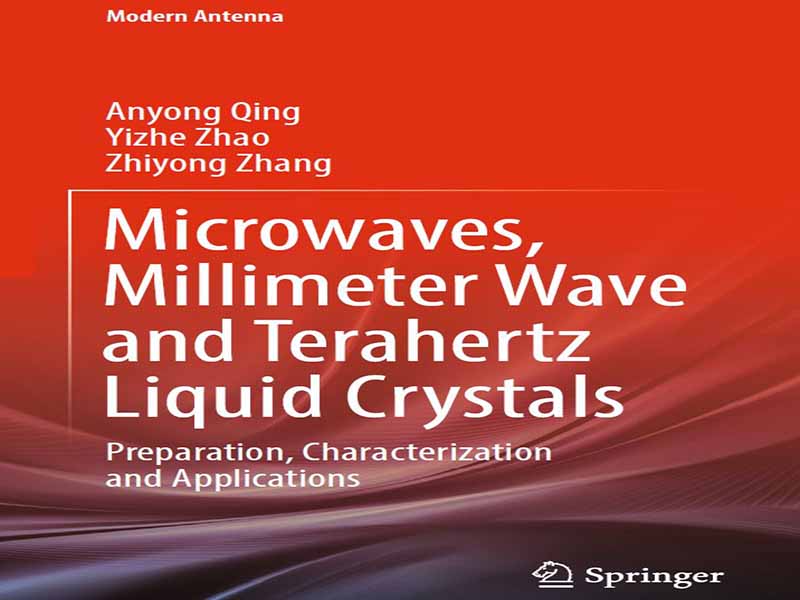

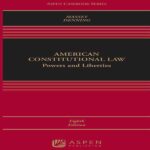




















نظرات کاربران